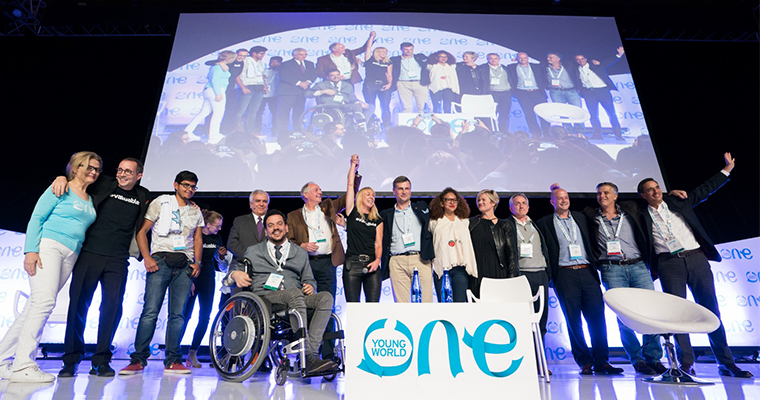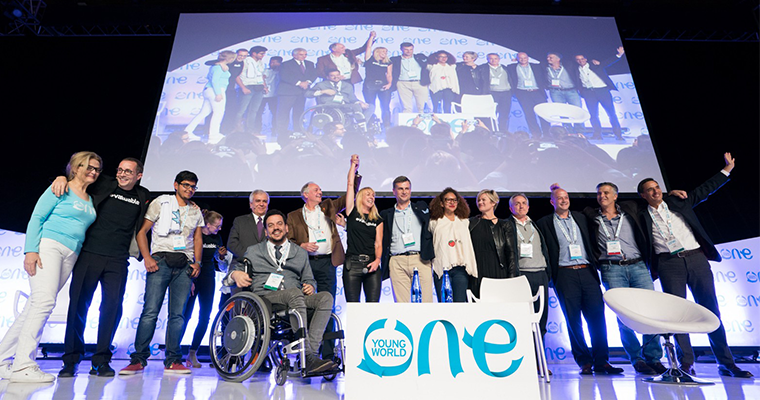
This article was originally published on Medium.
This week, The World Economic Forum will host its annual summit in Davos, Switzerland as business leaders, politicians and activists gather to discuss the world’s most pressing issues. This year, for the first time ever, disability inclusion will be centre stage in Davos — leading the global agenda and setting the example for regions, countries and industries worldwide. The driver behind this landmark moment for disability inclusion is social activist, founder of #valuable and One Young World Counsellor Caroline Casey.
A billion people globally are reported to live with some form of disability. To put it into perspective, that’s 15% of the global population — or 1 in 7 people. When you take into account the families affected, disability directly impacts over half of our global population. Economically, this combined community holds a disposable annual income of $8 trillion. Of course, as with every issue of inclusivity, in truth we’re all affected.
When you build a movement or look to activism, it’s important to look around and say “who’s not in this room?” Too often, people with disabilities are excluded through structural and systemic discrimination. One Young World has always championed young leaders with disabilities including Caroline, who first took the main stage at One Young World in Dublin, 2014. Three years later, she returned on stage in Bogota to launch the campaign — a launch moment that caught the attention of business leaders like Paul Polman, then CEO of Unilever, who answered her rallying call and became the first CEO to back #valuable.
Caroline often speaks of the need to move away from an ‘a la carte’ inclusion, where businesses pick and choose what they want to engage with and what they want to conveniently ignore. She worries when she hears things like “we aren’t doing disability this year” — inclusivity should be true in entirety. It’s part of our DNA at One Young World — and we’re finally seeing a shift in which organisations, institutions and global summits are awakening too.
Joining Caroline and Paul Polman in Davos is One Young World Ambassador Sinead Burke, a contributing editor to British Vogue and disability advocate. She says that the commercial case for inclusion “Inviting diverse voices, that include disabled people, to the table where decisions are made, produces creative, sustainable, results that are reflective of the needs at society at large.” Which is why, over the last year, Sinead has been embedded at the heart of the British fashion establishment who want to learn how design can benefit everyone.
One of our partners for One Young World 2019 London is broadcaster Channel 4, one of the first to lead the charge in becoming fully inclusive. Former CMO, Dan Brooke, was the first to insist that the Paralympics pundits include people with disabilities — a move that now seems like common sense but, in 2012, Channel 4 was the only Paralympic coverage worldwide to think so. In 2016, nearly every major global broadcaster featured Paralympian commentators, following Channel 4’s proof of the commercial case for inclusion.
At One Young World we have seen our community of Ambassadors leading the charge on disability inclusion. In The Hague we worked with the ‘include ME TOO’ campaign to give scholarships to inspirational leaders in the disability inclusion space.
Recipients include:
- Devika Malik, Indian founder of Wheeling Happiness, which raises funds for people with disabilities in sports and promotes better access and equality for those facing physical, emotional and social challenges.
- Enzo Romera, from Peru, is the CEO of giving hand, an organisation which develops highly-functional custom prosthesis for hands and fingers manufactured by 3D printing.
- Jack Milne, The Australian Youth Co-ordinator for the Royal Commonwealth Society, committed to improving transition from education to employment for young people with disabilities.
This week will highlight a great example of collaboration and present a real opportunity for business to move forward the conversation on disability inclusion. It is essential for any form of activism to look at the power of collaboration, as seen here. Thanks to the work of Caroline and others around the world, 2019 may be the year inclusivity will finally begin to be realised for all.

